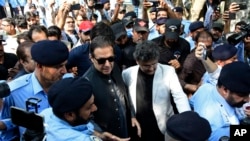A court in Pakistan decided Thursday it will indict the country’s populist former Prime Minister Imran Khan in a contempt case for threatening a female judge.
The 70-year-old opposition leader could end up in jail for six months if he is convicted. It would also lead to his disqualification from national politics for five years under Pakistan’s election laws.
After a hearing into the case, a five-judge panel of the high court in the capital, Islamabad, has ruled that charges against Khan will be framed on September 22.
The former prime minister has been holding massive anti-government rallies to press for early elections in a bid to stage a political comeback since being deposed as prime minister in April through a parliamentary no-confidence vote.
The contempt charges stemmed from a televised speech Khan made last month to tens of thousands of his party supporters in the capital.
He told the gathering his Pakistan Tehreek-e-Insaf (PTI) party would bring lawsuits against a female judge and senior Islamabad police officers for their roles in the alleged custodial torture of one of his close aides. "We will not spare you. … We will sue you,” Khan vowed.
City police later charged him under Pakistan’s anti-terrorism law for threatening their officers, while the high court summoned him to explain his controversial remarks against the judge.
Khan, in his written response submitted to the court earlier this week, expressed regret rather than an outright apology, saying his “unintentional utterances” at the rally did not mean to threaten the judicial officer.
The court on Thursday declared Khan’s response “unsatisfactory” and decided to indict him later this month.
“We are not convinced that the respondent has purged himself of the wrongdoing alleged against him,” English-language Dawn media quoted the ruling as saying.
Khan’s detained aid, Shahbaz Gill, faces treason charges for allegedly inciting in televised remarks Pakistani military officers to mutiny, allegations the detainee has rejected.
Gill accused security personnel of electrocuting his genitals while being subjected to torture to extract a confession against Khan.
The government of Prime Minister Shahbaz Sharif has rejected the allegations.
Khan's nationwide rallies are attended by tens of thousands of his PTI supporters where the cricketer-turned-politician denounces Sharif’s coalition government as corrupt and an outcome of a U.S.-backed conspiracy, without evidence.
Both the government and Washington deny the charges, calling them politically motivated.
The no confidence vote deposed Khan amid a deepening economic crisis and his strained ties with the country’s powerful military, which united Sharif-led opposition at the time and eventually resulted in a multi-party coalition against Khan.
But the ousted prime mister’s popularity has since grown dramatically and criticism of the Sharif administration over worsening economic conditions, with inflation rising to historic levels and the high cost of utilities, has helped Khan build his anti-government campaign, according to analysts.






